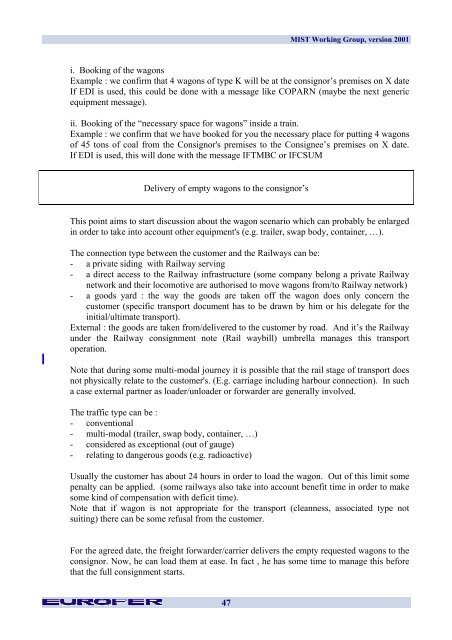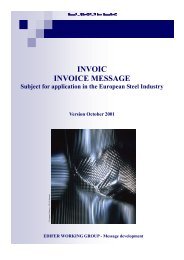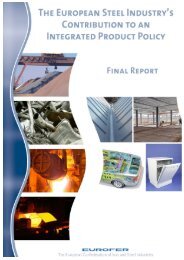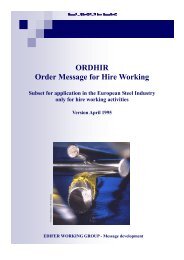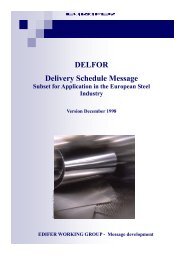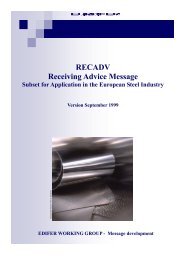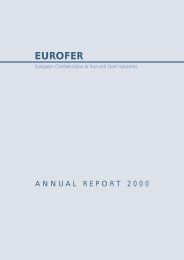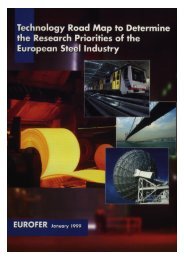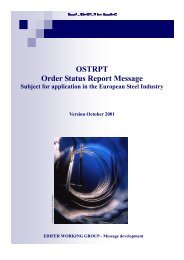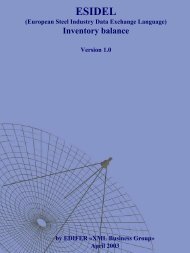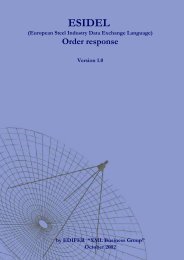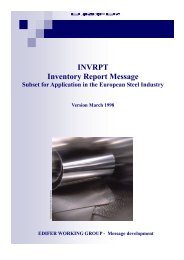Multi Industry Scenarios for Transport - Eurofer
Multi Industry Scenarios for Transport - Eurofer
Multi Industry Scenarios for Transport - Eurofer
You also want an ePaper? Increase the reach of your titles
YUMPU automatically turns print PDFs into web optimized ePapers that Google loves.
47<br />
MIST Working Group, version 2001<br />
i. Booking of the wagons<br />
Example : we confirm that 4 wagons of type K will be at the consignor’s premises on X date<br />
If EDI is used, this could be done with a message like COPARN (maybe the next generic<br />
equipment message).<br />
ii. Booking of the “necessary space <strong>for</strong> wagons” inside a train.<br />
Example : we confirm that we have booked <strong>for</strong> you the necessary place <strong>for</strong> putting 4 wagons<br />
of 45 tons of coal from the Consignor's premises to the Consignee’s premises on X date.<br />
If EDI is used, this will done with the message IFTMBC or IFCSUM<br />
Delivery of empty wagons to the consignor’s<br />
This point aims to start discussion about the wagon scenario which can probably be enlarged<br />
in order to take into account other equipment's (e.g. trailer, swap body, container, …).<br />
The connection type between the customer and the Railways can be:<br />
- a private siding with Railway serving<br />
- a direct access to the Railway infrastructure (some company belong a private Railway<br />
network and their locomotive are authorised to move wagons from/to Railway network)<br />
- a goods yard : the way the goods are taken off the wagon does only concern the<br />
customer (specific transport document has to be drawn by him or his delegate <strong>for</strong> the<br />
initial/ultimate transport).<br />
External : the goods are taken from/delivered to the customer by road. And it’s the Railway<br />
under the Railway consignment note (Rail waybill) umbrella manages this transport<br />
operation.<br />
Note that during some multi-modal journey it is possible that the rail stage of transport does<br />
not physically relate to the customer's. (E.g. carriage including harbour connection). In such<br />
a case external partner as loader/unloader or <strong>for</strong>warder are generally involved.<br />
The traffic type can be :<br />
- conventional<br />
- multi-modal (trailer, swap body, container, …)<br />
- considered as exceptional (out of gauge)<br />
- relating to dangerous goods (e.g. radioactive)<br />
Usually the customer has about 24 hours in order to load the wagon. Out of this limit some<br />
penalty can be applied. (some railways also take into account benefit time in order to make<br />
some kind of compensation with deficit time).<br />
Note that if wagon is not appropriate <strong>for</strong> the transport (cleanness, associated type not<br />
suiting) there can be some refusal from the customer.<br />
For the agreed date, the freight <strong>for</strong>warder/carrier delivers the empty requested wagons to the<br />
consignor. Now, he can load them at ease. In fact , he has some time to manage this be<strong>for</strong>e<br />
that the full consignment starts.


